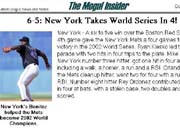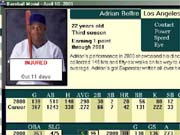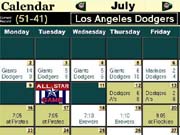Baseball Mogul 2002 is the computer game equivalent of a dream come true for anyone who collected baseball cards as a kid. The management simulation lets you trade in that cheap cardboard and take complete control of your Major League faves in a drive to bring home the pennant. Sign 'em, sit 'em, or ship 'em off to Montreal at the trade deadline--it's completely up to you. The game is so effective at drawing out your inner child that by the midway point of your first simulated season, you'll find yourself longing for a stick of cementlike gum.

Unfortunately, the above could also have been said for the original Baseball Mogul, way back when the concept was new and intriguing. Now, three iterations and as many years later, the bloom is off the rose and the entire idea seems a bit tired. Those who have been with the series from the very beginning can't help but get a sense of déjà vu when loading up the new game, which is a lot like the "new" game from last summer, which was a lot like the "new" game from the summer before that. As much as it might be unfair to fault a game for what it isn't, it's hard not to demand some sort of rejuvenation from a series this far down the road. Winning concept or not, nobody wants to buy the same thing, year after year.
Of course, if you've never played one of the previous releases in this line, you're in for a real treat. Broken down to its basics, Baseball Mogul 2002 is all about winning, both on the field and in the accounting ledgers. You're sort of like an owner, general manager, and manager rolled into one, with godlike control over everything from the price of admission to who gets to bat cleanup. All the official Major League Baseball Players Association members are on hand, in contrast with previous years when fictional players were used. The game still lacks the full Major League license, meaning that you'll have to input team nicknames yourself if you want that extra touch of authenticity.
You keep track of everything with an easy-to-use interface that organizes all of your team's stats and relevant financial data on readily available menus. Player cards containing all the current stats and a scouting report can be checked by just double-clicking on the players' names. Complete box scores and remarkably thorough game summaries are available from the calendar screen. Games themselves can be simmed one day at a time, or you can move through the schedule by the week, month, half season, or entire season. Simulation time is incredibly fast. Click on "entire season" and run off to make a sandwich, and the game will have made it to October by the time you reach for the mustard.

Important league happenings are further highlighted in the Mogul Insider. Updated every day with at least one story, this screen runs down the current headlines, complete with full newspaper-style stories and photos. This feature, which has been with the Baseball Mogul series since its inception, now covers more big-league happenings than ever, from hard-fought wins to noteworthy individual achievements to failed negotiations and trades. It remains the most memorable part of your experiences with the game, providing Basball Mogul 2002 with a lot of its unique charm and attitude--you'll enjoy being able to read about the exploits of your team and players in the newspaper.
The only significant interface miscue is an inability to track player movement around the league, aside from just scanning the headlines for an announcement. Still, the game is very friendly to beginners. This is a consequential achievement all on its own, considering the often confusing interfaces found in similar games. Compared with most other baseball management simulations, such as the ridiculously convoluted Diamond Mind Baseball and the unwieldy APBA Baseball for Windows, Baseball Mogul 2002 is as accessible as a first-grade primer.
The actual gameplay is also easy to get into, both for beginners and sports management veterans. Very little here will cause even the most fervent statistics worshipper to raise an eyebrow. A number of simulated seasons reveal nothing amiss...aside from the depressing ability of the Atlanta Braves to make the playoffs for six years in a row. Dominating pitchers include usual suspects such as perennial Cy Young winners Pedro Martinez, Greg Maddux, and Randy Johnson. Pitcher win totals, strikeout numbers, walks, ERA, and so on are all within the expected parameters. The same can be said of batters, who perform pretty much exactly as can be forecast at the plate. Alex Rodriguez, Frank Thomas, Mike Piazza, Vladimir Guerrero, and their fellow MLBPA unionists all hit just as they should, in terms of home run numbers and batting averages. There is the occasional surprise, like Homer Bush hitting .308 with 87 RBI in 2001, but nothing that challenges the game's credibility.

A few weak moments can strain your attachment at times, however. Injuries are sometimes spelled out, sometimes left vague. For example, while you're told that Chan Ho Park has a "wrist stress fracture" and is gone for 33 days, Adrian Beltre might merely be "injured" and out for 19. This happens just frequently enough to be irritating. Furthermore, setting your team's ticket price is done on a sliding scale, with respect to the average pricing for the rest of league, so you never have an exact dollar value on what you're currently charging. Actually, dollars aren't a part of the game in any way, having been replaced last year by points. This abstract system, which is used mostly to rate player salaries, remains somewhat difficult to grasp. Points do mean more this year, though, as there is more player movement during the off-season. Teams often decide that they simply can't afford some of their top veterans.
Player trading has been tinkered with a great deal, resulting in a system that is both better and worse than last year. With the new trading block feature, you can designate a player to be shopped around and then openly solicited--it is a great addition in theory, but it simply doesn't work. Aside from an annoying bug that forces you to leave the screen if you try to replace the first player put on the block with another, it invariably generates terrible offers. Dangle a superstar like Gary Sheffield or Barry Bonds out there, and you'll get nothing but motley collections of prospects and longshots whom nobody this side of Gord Ash would consider accepting as fair value. It's nice that the designers wanted to represent the current financial atmosphere that surrounds most big transactions these days and make the computer AI tougher, but this goes too far in that regard and makes trading a losing proposition almost all the time. Dealing face-to-face with other GMs can result in superior deals, though even then, it's a little too hard to pull the trigger on a move that will make a real difference in the August and September stretch run.

Like most sports management games, Baseball Mogul 2002 lacks modern presentation values. Screen resolution is fixed at a disappointing 640x480, and menu screens lack much in the way of added pizzazz and color. Many of these screens haven't changed much since the early days of the series. It's a shame that the designers didn't borrow some ideas from their competition at Out of the Park Baseball 3 and liven up the display of data with a more vibrant palette and a few ballpark photographs. Thankfully, they did take full advantage of the new MLBPA license by adding color photos of all the players, including head shots with the player stat cards and action shots on the Mogul Insider's front page. This adds a nice touch of humanity to the roster and, not to mention, a greater sense of realism.
Audio is nearly nonexistent. Though there are a few basic sounds, like the crackly turning of a page every time you open the Mogul Insider to check the headlines, you might as well be playing with your system's volume muted. A few extra effects would certainly be welcome, though they wouldn't be necessary.
Baseball Mogul 2002's greatest success, as well as most disappointing failure, is that the captivating gameplay remains virtually identical to the first game in the series. That's a real plus for those just discovering the game, but a real negative for longtime fans who have been managing their favorite big league clubs since the debut of the original Baseball Mogul in 1998. Though some appreciable innovations and improvements clearly make this current edition the best Baseball Mogul ever, it remains similar enough to its predecessors that it's impossible to recommend it to those with last year's model. But if you have yet to be introduced to this series--or perhaps even to sports management sims in general--there's no better place to start than right here.